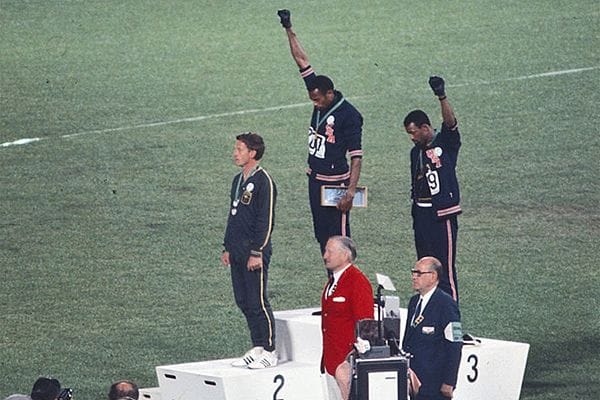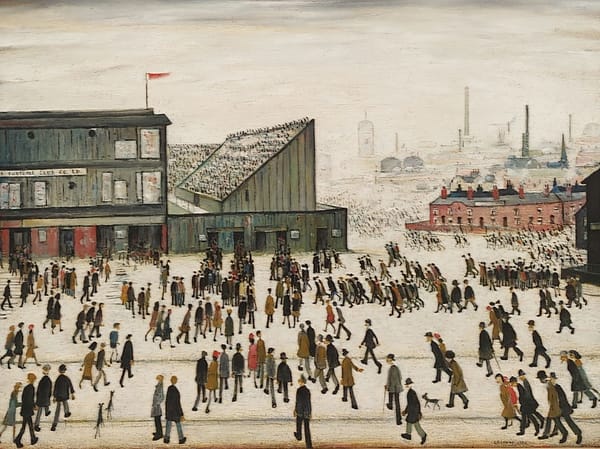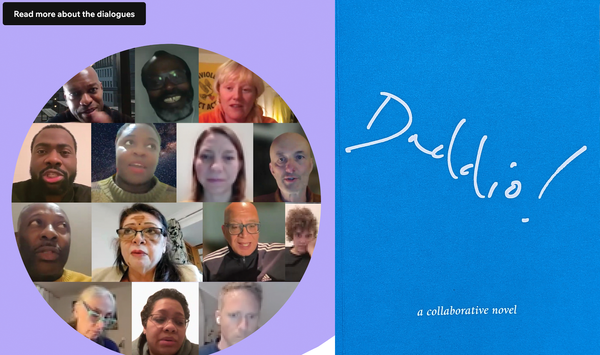How time travel is the key to coping with The Shitshow.
Using the lesser known Greek concepts of time, Kairos and Aion, to save us from the tyranny of Chronos.

Last year some of the Absurd Intelligence crew went on a school trip to the launch of Oxford University’s Ministry for the Future. Mainly so we could stan Kim Stanley Robinson.
Part way through his keynote, in the bonkers opulence of the Sheldonian Theatre, Stan spied our Clare, who had recently been found not guilty of criminal damage at HSBC’s headquarters. His face lit up as he ad-libbed a riff on climate activism. “Window smashing,” he said, “is an act of time travel.” Some shout-out 🥰 from arguably the greatest living writer of speculative fiction 🪐 (and pupil of Ursula K. Le Guin 🙌).
Because we’ve been a bit obsessed with time and how to travel it for a while.
I used to say that Extinction Rebellion, where many of us met, was an act of reaching into a transformed future: to grab as much of it as possible and bring it back into the here-and-now. It was a concertina-ing of time, because we couldn’t wait. It used to wind people up something rotten. People steeped in Age of Reason logic. People without any imagination. People who knew how time works.
But what if they didn’t? This conversation between Metalabel’s Yancey Strickler and Time Loops author Eric Wargo is THE BEST use of 112 minutes of old-fangled earth time. Trust me 😵💫, you’ll never be able to stare a clock in the face again.

Time is why the Extinction Symbol (that became Extinction Rebellion’s logo) features a stylised sand timer. It’s why ACT NOW is one of XR’s three demands. And why XR’s call for Net Zero by 2025 remains unchanged. In a world of missed targets and kicking consequence into the long grass (and right up the arses of young people) it is a sobering intervention in time:
‘When XR was launched in 2018, 2025 was a realistic date, seven years in the future, with plenty of time to do what was needed. We keep this target to show how much time has been lost.’ XR website
And lost it seems to be. Last Orders have long been called. 1.5 is as dead as 2.0 degrees is fucked. It IS Time, Ladies and Gentlemen.
And we haven’t got homes to go to.
But you know what, XR was saying exactly that seven years ago. So to some people, time hasn’t run out, it’s simply stood still. So maybe we need to revisit what we think of time. Or more usefully, what we think time is.
And how it can help us navigate The Multifaceted Intersecting Shitshow.
Three ancient Greek concepts of time: #1 Time is Opportunity (Kairos)
“This mood makes itself felt everywhere, politically, socially, and philosophically. We are living in what the Greeks called the ‘Kairos’ – the right moment – for a ‘metamorphosis of the gods’, of the fundamental principle and symbols.” Carl Jung, The Undiscovered Self
I first came across the concept of Kairos when Zoë Blackler was setting up her space of the same name, to explore radical ideas for social and cultural change. It was fairly mind-mangling to discover that there was an ancient Greek word that described exactly what XR had instinctively been doing.
While the media narrative, liberal reluctance, and business-as-usual pushback cosied-up in the comfort of ‘we-like-your-aims-but-not-your-methods’ responses, many of us involved in the strategy, creative and media teams knew we were doing something less straightforward than protesting about climate. What we were up to was much more akin to Howard Beale’s clarion call in the film Network:
The film could easily have been written in 2018, about inequality, climate, or democracy; in 2025, about inequality, climate, or democracy; or any time in the last 50 years about the (I repeat myself) Multifaceted Intersecting Shitshow.
‘We know things are bad – worse than bad. They’re crazy. It’s like everything everywhere is going crazy, so we don’t go out anymore. We sit in the house, and slowly the world we are living in is getting smaller, and all we say is: ‘Please, at least leave us alone in our living rooms. Let me have my toaster and my TV and my steel-belted radials and I won’t say anything. Just leave us alone.’
‘Well, I’m not gonna leave you alone. I want you to get MAD! I don’t want you to protest. I don’t want you to riot – I don’t want you to write to your congressman, because I wouldn’t know what to tell you to write. I don’t know what to do about the depression and the inflation and the Russians and the crime in the street. All I know is that first you’ve got to get mad. (shouting) You’ve got to say: ‘I’m a human being, god-dammit! My life has value!’
Kairos is all about the importance of time as a ripened moment, the measurement of an emergence of meaning, of understanding, fruit to be picked (and do it now, don't miss this chance!). As Brian Eno has said, revolutions occur
“first, when everyone realises something is wrong, and second – more importantly – when everyone realises that everyone else has realised.”
To live in the Kairos is to measure time not as something that passes, but as time pressing into and changing space: a transformation. Not an abstract, dinner party conversation about the possibility of transformation, but actual embodied remodelling. And as ‘illogical’ or ‘annoying’ or ‘divisive’ or ‘counter-productive’ or ‘selfish’ as it might be, sitting in a road or throwing soup on a Van Gogh or smashing a window is utterly Kairotic.
And that is the first way to travel through time.
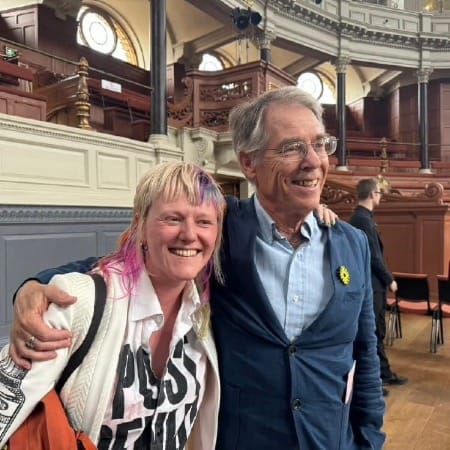
#2 Time is repetition, repetition, repetition (Aion)
The best thing about time being three things at once is that it supports nuance; it can be both a common touchstone we all understand, and a variable metric we have to stop to wonder at.
Even though linear clock time might utterly dominate our lives through things like ⌚️working hours, ⌚️shared calendars, ⌚️KPIs and ⌚️deadlines, we do also know that time is 🐣 important, or 📸 memorable, or ♻️ cyclical.
Time hides in plain sight and our shared consciousness in all its variables. Sometimes we’re up against it:
Beat The Clock — Sparks
In more Kairotic timbre:
The Times They Are a-Changin’ — Bob Dylan
For the ancient Greeks there was another measure of time: Aion.
Long time, repetitive time; ritual, cyclic.
Time After Time — Cyndi Lauper
Aion is the time of the zodiac ♒️, of the seasons 🌽. It’s a more ancient time. While we still understand it of course, it has been relegated in many of our modern minds. But for how long? We can all see the seasons slipping: the leaves 🍁 that used to fall like clockwork in the winter half-term now linger on ’til 🎄nearly Christmas. And just how long will we continue to buy Peruvian-grown summer vegetables in the depth of winter because it’s convenient?
We are about to lose the last generation of people who can remember a time before supermarkets, a time where flying was something done in the fight against fascism. When necessity was about what is necessary. When a year was marked by how we cooked our potatoes, and the first runner beans heralded summer – our sense of taste helping us navigate our passage through time.
Like land, and our collective ability to cultivate it for survival, time has long been subjected to a process of enclosure. Where once the year was marked by the seasons, first the Romans and then the Catholic Church codified the Julian and Gregorian calendars 📅. So, we no longer start the year on the winter or spring solstice; our relationship to the earth is disrupted in the name of organisation (often known as “progress”). A visit to a local Chinatown in late January might be the nearest many of us get to the idea that time might be organised along 🌚 lunisolar 🌞 lines; an image gallery on a news website our last glimpse of the importance of a full moon 🌝.
Aionic time reconnects us. It reminds us that the repetition of ritual is a vital navigation of the world around us. And while Aionic time is most definitely spiritual, it can also be mundane, and no less important for it.
Rituals were central to Extinction Rebellion’s rapid growth. XR drew on systems of repetition that allowed the movement to move further and faster than business-as-usual (the aforementioned Yancey Strickler called XR “the fastest startup in history”. And he started Kickstarter 😳).
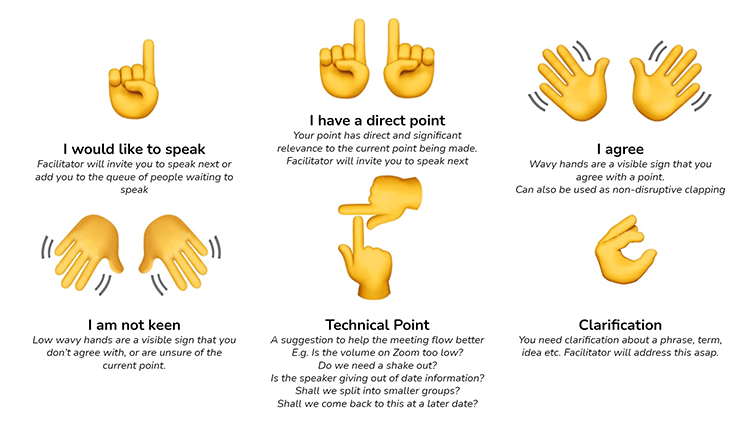
Hand signals and rigorous meeting facilitation allowed XR to navigate complex onboarding and organisation. Its Principles and Values enabled anyone, anywhere to set up a local Extinction Rebellion group, or plan an action.
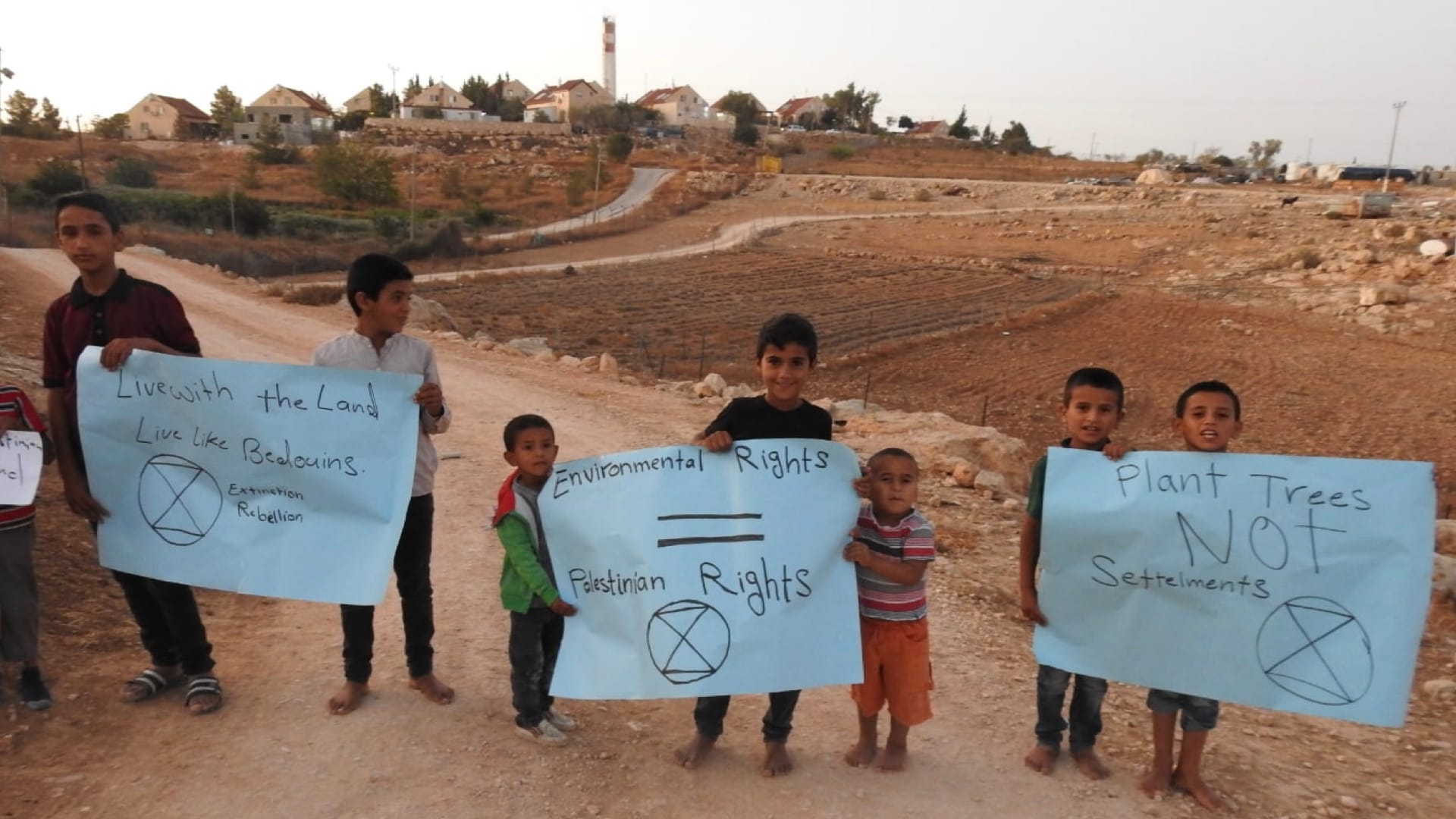
XR’s design programme was given away at the earliest opportunity, with minimal rules, which allowed new groups however small to be seen as part of a blossoming international movement.

The repetition, repetition, repetition of ritual and the generosity with which thinking was distributed without any intention of control was a beautiful manifestation of Aion. Of shared values facilitating a careful, sustainable cultivation of localised resource around the world.
Little did we know it, but XR was commoning-at-work, creating a Protest Commons, reclaiming organised resistance from the enclosures of politics and NGOs.
This second concept of how to travel time goes a long way to addressing one of the biggest divides in Movement Organising: namely, the schism between Momentum and Community. Organising the latter is necessarily slow. It takes TIME to build community, to do the hard graft building trust and collaboration on the ground. In countless social movements there has been disagreement between those who believe the slow, cyclical work is key, and those who want to move kairotically (NOW NOW NOW) to tear down the old, so the new may be built.
The truth is (and we’ll cover the work of the movement theorist Bill Moyer in a future post) change requires both. But I’ll just say this: to think of the considered, careful work of commoning and community as being measured in Aionic time is to be able to hold difference lightly and to be able to collaborate strategically and effectively.
#3 Time (Clock of the Heart) (Chronos)
‘Ooh, in time it could have been so much more
The time is precious I know
In time it could have been so much more
The time has nothing to show’
Culture Club
Finally, the third concept of ancient Greek time: Chronos. The real motherfucker. The one that runs out. The measure that screams “IFONLYWEHADMORE”. The metric that ticks away towards an ever-more certain deadline as we watch the world’s elites do absolutely fucking nothing with their wealth and power except abuse it.
The utterly brilliant philosopher Carmody Grey talks about how it’s as if we are collectively walking towards a cliff-edge. Some people see what is happening, and attempt to warn the crowd. But as realisation spreads people pick up their pace. Soon the multitude is running towards the cliff. Insane? Not if you’ve lost the ability to encounter the world through anything other than Chronos-time. Our ideas shape our worlds. Chronos is the stopwatch counting that race. ⏱️
If we only have Chronos to measure ourselves against, we might as well throw in the towel now. Many do. It’s repeatedly tempting, and easy. As Omar El Akkad said this week at an event to celebrate the publication of his unmissable book One Day, Everyone Will Have Always Been Against This all one has to do to get by or comply is look away. Because our Western cultures have become so dominated by the single lens of Chronos, we’ve lost sight of the Kairos-within or the Aion-beyond the Shitshow. When we believe we have no time left, looking away is SO much easier.
But thank fuck we don’t just have Chronos. We have Aion to guide both our morality and collaboration. We have Kairos to remind us of the importance of the transformative potential of moments. When these understandings are combined, it is then that the tick, tick, tick of chronological time becomes useful. Then, it can drive us to embody our morality, step by step. Then, it becomes the metronome to help us navigate what Freud called the narcissism of small differences, or, if you prefer, the tyranny of agreement.
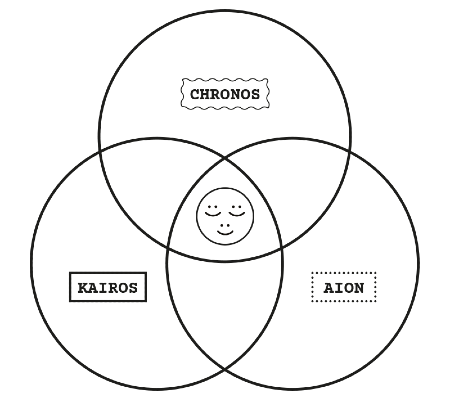
The intersection of Kairos, Aion and Chronos is strategic and alchemical. It provides a context where many can agree on the aims, without having to align on the methods.
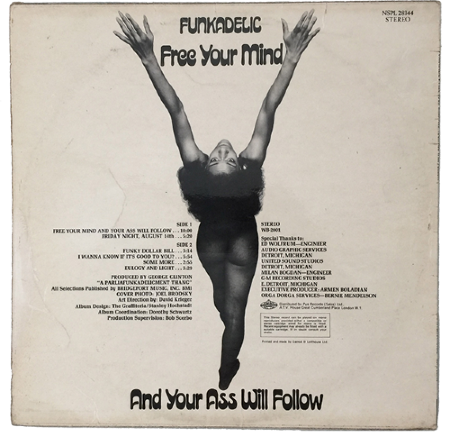
It allows us to get out of our heads 🧠, into our hearts 💚, and most importantly, off our arses ✊.
More of that – and what it might mean in 2025 – next time we post about time travel.
